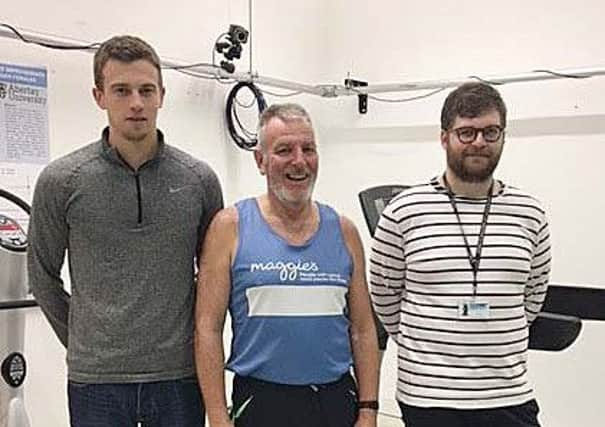Scot battling incurable cancer takes on marathon challenge


Eric Hamilton, from Dundee, is set to take on the 26-mile challenge next April, despite doctors discovering he had an inoperable and incurable form of lung cancer in spring last year.
The 60-year-old decided to enter the race after a combination of treatment with a new chemotherapy “wonder drug” and a taking up running seemed to have a miraculous effect on prolonging his life.
Advertisement
Hide AdAdvertisement
Hide AdScans have shown the drug Afatnib is stopping Mr Hamilton’s tumour from growing for the time being and his condition is no longer considered terminal.
However, he doesn’t know how long it will keep him alive.
The father of three used to run in the 1980s and early 1990s, but only took up it up again after his illness was diagnosed.
“Running made me feel better – I didn’t have any chest pains – and I’ve had pretty much daily runs ever since,” he said.
“My philosophy was basically this: exercise or die. I was initially scared I was going to die tomorrow, so I did this to prove that wasn’t going to happen.”
He also has ambitions to run up Ben Nevis, climb the Rocky Mountains and scale the tallest tree in the United States.
“I’m only as good as my next scan but I’m very happy to be living, breathing and running,” he added.
“My motto is ‘I’m not deid until I’m deid’. I plan to live as much as I can.”
His inspirational story has even seen him featured in a television documentary about the Maggie’s charity cancer centres, broadcast last month.
Advertisement
Hide AdAdvertisement
Hide AdNow a team of experts at Dundee’s Abertay University have been conducting gait analysis and physical testing in preparation for his forthcoming test of endurance.
He said: “I’ve had some problems with shin splints and I also wanted to lose a few more pounds before the race, so I got in contact with the guys at Abertay for some help.
“I’m hoping they can sort out my running gait and advise me how I should be running.
“I’ve not run a marathon for 25 years.”
Sport and exercise science lecturer Dr Ashley Richardson, who conducted the analysis, believes the results will allow him to optimise training for the marathon.
“Efficiency of movement is fundamental when preparing for long-distance runs such as a marathon,” he said.
“What Eric and other runners alike need is maximal linear translation using the minimal amount of energy.
“An abnormal, inefficient running gait may also increase the risk of injury.
“Completing observational gait analysis can help Eric correct his biomechanics to one that is safer and more economical.
Advertisement
Hide AdAdvertisement
Hide Ad“This will allow for an improved performance running time and minimise the risk of running injuries.”
Mr Hamilton is a member of the Maggie’s Centre’s support group in Dundee, which meets up every month.
He also attends mindfulness sessions and works out with a personal trainer at the centre.
He is currently the only person in Tayside who has been matched as suitable for treatment with Afatnib.